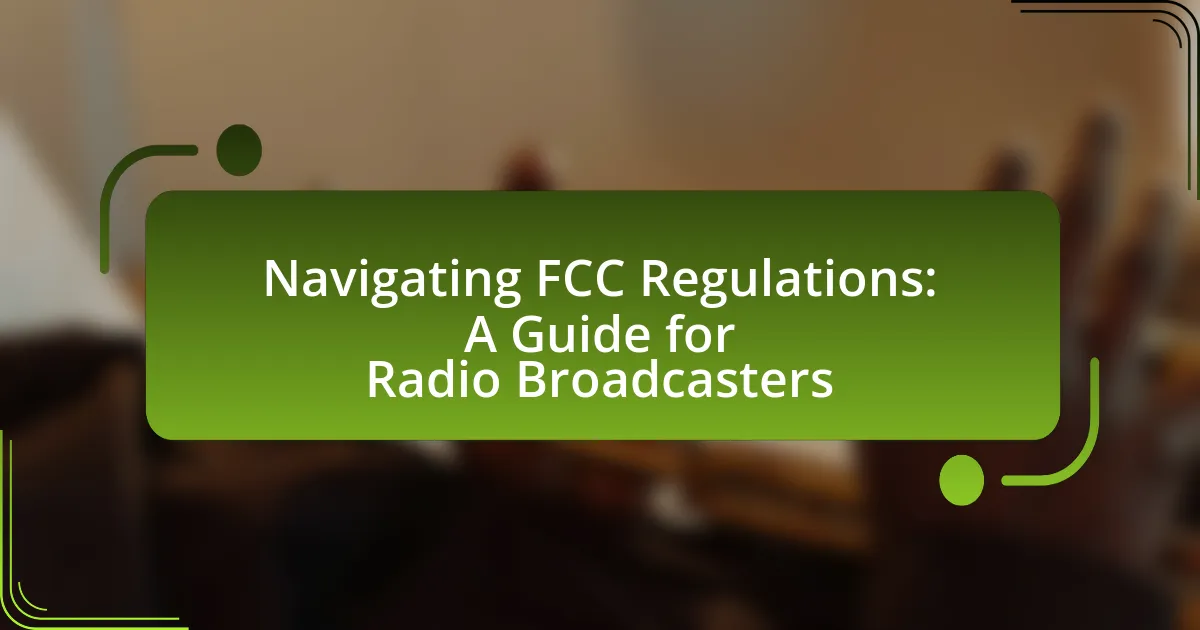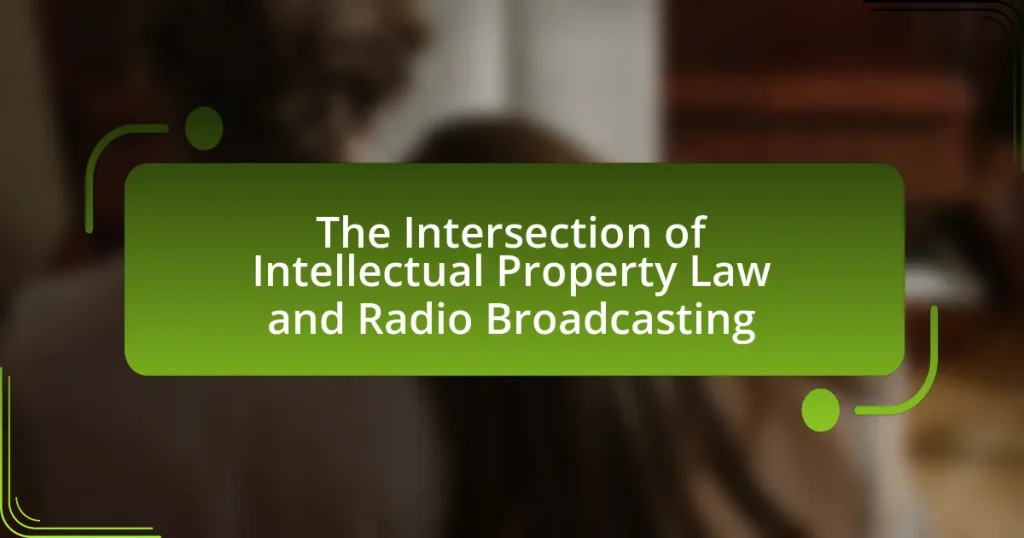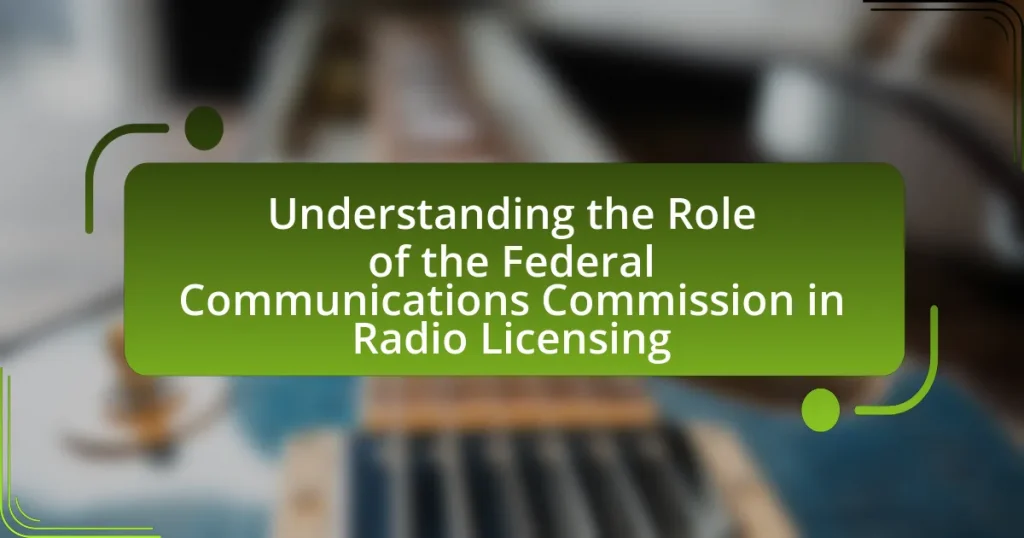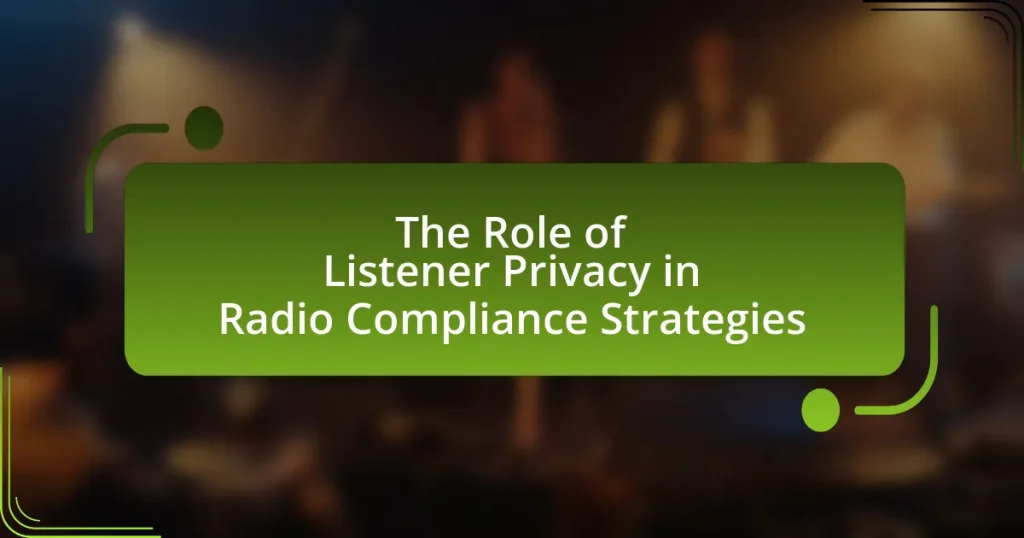The article focuses on the Federal Communications Commission (FCC) regulations that govern radio broadcasters in the United States. It outlines the essential components of these regulations, including licensing requirements, content restrictions, and technical standards, which are crucial for maintaining fair broadcasting practices. The article also discusses the impact of these regulations on broadcasting operations, the importance of compliance, and the potential risks broadcasters face without adherence. Additionally, it provides insights into the types of FCC licenses available, the renewal process, common compliance issues, and best practices for ensuring regulatory adherence. Overall, the article serves as a comprehensive guide for radio broadcasters navigating the complexities of FCC regulations.
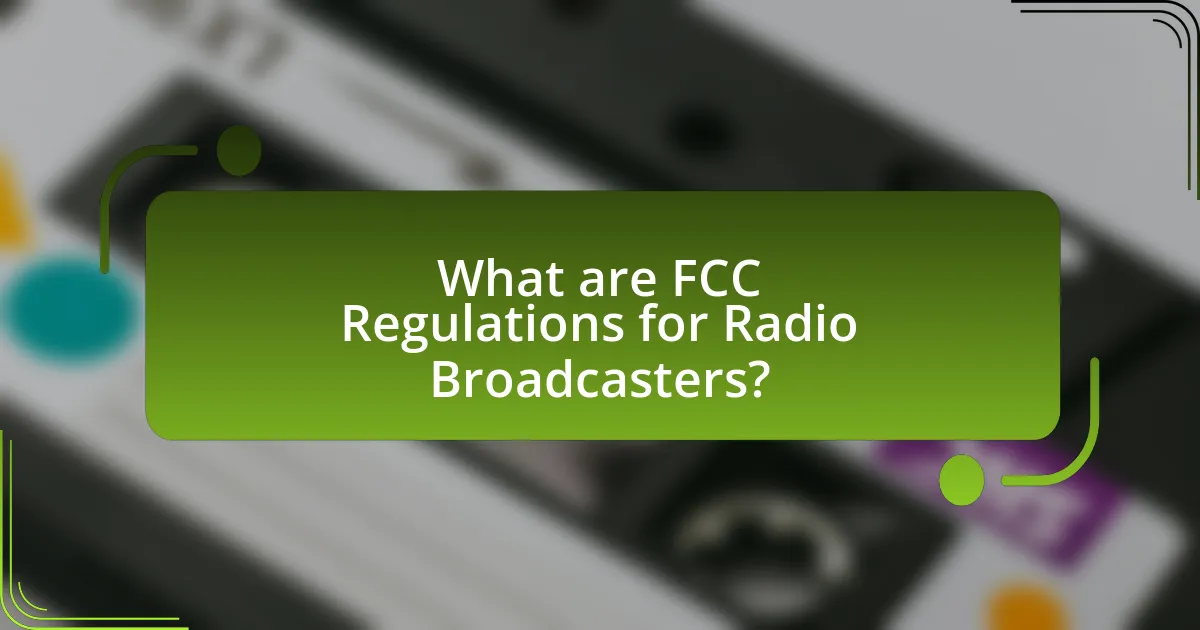
What are FCC Regulations for Radio Broadcasters?
FCC regulations for radio broadcasters are a set of rules established by the Federal Communications Commission to govern the operation of radio stations in the United States. These regulations cover various aspects, including licensing requirements, content restrictions, and technical standards. For instance, broadcasters must obtain a license to operate, adhere to specific programming guidelines that prohibit indecent content during certain hours, and comply with technical standards to minimize interference with other stations. The enforcement of these regulations ensures that radio broadcasting operates fairly and effectively, maintaining a diverse and accessible media landscape.
How do FCC regulations impact radio broadcasting?
FCC regulations significantly impact radio broadcasting by establishing rules that govern licensing, content, and technical standards. These regulations ensure that broadcasters operate within designated frequencies, maintain signal quality, and adhere to content guidelines, such as decency standards and public interest obligations. For instance, the Communications Act of 1934 and subsequent amendments require broadcasters to obtain licenses from the FCC, which are contingent upon fulfilling specific criteria, including serving the public interest and avoiding interference with other stations. Additionally, the FCC enforces regulations on ownership limits to promote diversity in media voices and prevent monopolistic practices.
What are the key components of FCC regulations?
The key components of FCC regulations include licensing, spectrum management, content regulation, and enforcement mechanisms. Licensing ensures that broadcasters obtain the necessary permits to operate, which is crucial for maintaining orderly use of the airwaves. Spectrum management involves the allocation and assignment of frequencies to prevent interference among different services. Content regulation encompasses rules regarding indecency, obscenity, and public interest obligations, ensuring that broadcasters adhere to community standards. Enforcement mechanisms allow the FCC to impose penalties and take corrective actions against violations, thereby upholding compliance with established regulations. These components collectively ensure the effective governance of communication services in the United States.
How do these regulations ensure fair broadcasting practices?
Regulations ensure fair broadcasting practices by mandating equal access to airwaves and preventing monopolistic control. The Federal Communications Commission (FCC) enforces rules that require broadcasters to provide balanced coverage of public issues, ensuring diverse viewpoints are represented. For example, the Fairness Doctrine, although no longer in effect, historically required broadcasters to present contrasting viewpoints on controversial issues, promoting fairness. Additionally, regulations limit the number of stations one entity can own in a market, which helps maintain competition and prevents any single broadcaster from dominating the narrative. These measures collectively foster a broadcasting environment that prioritizes fairness and diversity in content delivery.
Why are FCC regulations important for radio broadcasters?
FCC regulations are important for radio broadcasters because they establish the legal framework that governs broadcasting operations, ensuring compliance with standards for content, technical specifications, and licensing. These regulations protect the public interest by promoting fair competition, preventing interference between stations, and ensuring that broadcasters adhere to guidelines regarding decency and public service obligations. For instance, the Communications Act of 1934 and subsequent amendments set forth requirements for obtaining and renewing broadcast licenses, which are essential for maintaining a broadcaster’s ability to operate legally.
What risks do broadcasters face without compliance?
Broadcasters face significant legal and financial risks without compliance with FCC regulations. Non-compliance can lead to hefty fines, which can reach up to $325,000 per violation, and potential loss of broadcasting licenses. Additionally, failure to adhere to content regulations may result in legal actions from affected parties, damaging the broadcaster’s reputation and leading to loss of audience trust. Historical data shows that broadcasters who do not comply with regulations often face increased scrutiny and enforcement actions from the FCC, further exacerbating their operational challenges.
How do regulations protect consumers and the public interest?
Regulations protect consumers and the public interest by establishing standards that ensure safety, fairness, and transparency in various industries. For instance, the Federal Communications Commission (FCC) enforces regulations that require broadcasters to provide accurate information, thereby preventing misinformation and promoting informed decision-making among the public. Additionally, regulations mandate equal access to services, such as ensuring that all consumers can access emergency broadcasts, which is crucial for public safety. Historical data shows that regulatory frameworks have significantly reduced instances of fraud and exploitation in sectors like telecommunications and broadcasting, thereby enhancing consumer trust and safeguarding public welfare.
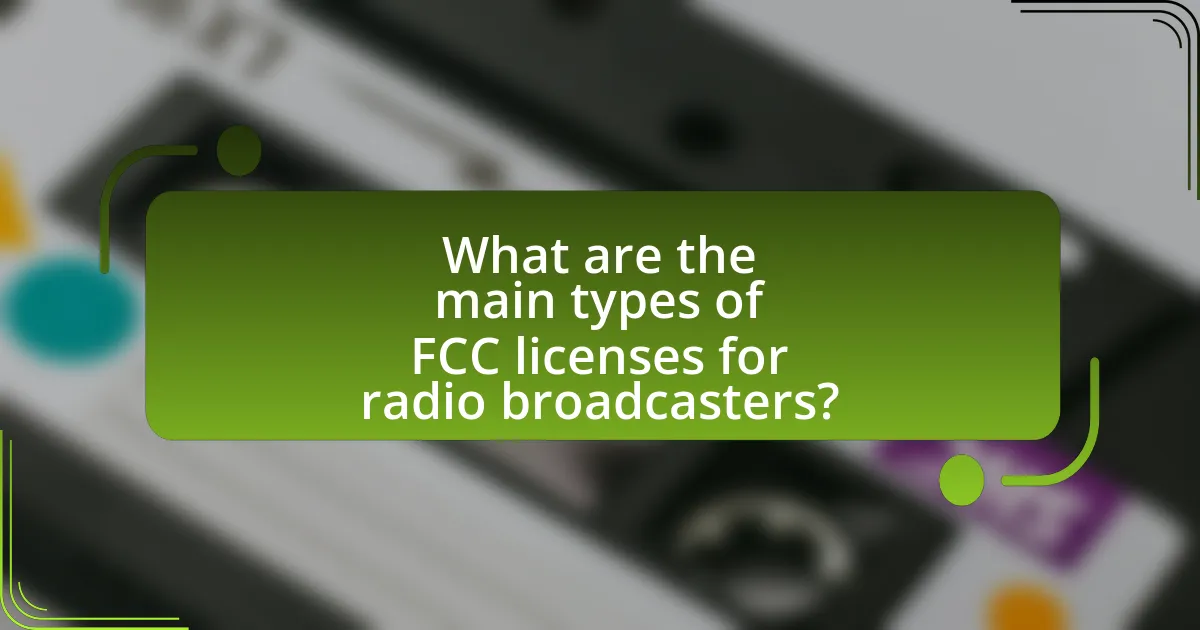
What are the main types of FCC licenses for radio broadcasters?
The main types of FCC licenses for radio broadcasters are AM, FM, and LPFM licenses. AM (Amplitude Modulation) licenses are for standard radio broadcasting, FM (Frequency Modulation) licenses are for higher fidelity audio broadcasting, and LPFM (Low Power FM) licenses are intended for non-commercial educational broadcasting with a limited coverage area. These licenses are regulated by the Federal Communications Commission to ensure proper use of the radio spectrum and compliance with broadcasting standards.
How do different licenses affect broadcasting operations?
Different licenses significantly impact broadcasting operations by determining the scope, reach, and regulatory compliance of a broadcaster. For instance, a commercial broadcasting license allows for profit-driven operations and advertising, while a non-commercial educational license restricts revenue generation to grants and donations, influencing funding strategies. Additionally, licenses dictate technical parameters such as frequency allocation and power limits, which directly affect signal coverage and audience reach. Regulatory compliance requirements, such as public service obligations and content restrictions, vary by license type, shaping programming decisions and operational practices. These distinctions are crucial for broadcasters to understand in order to navigate the complex landscape of FCC regulations effectively.
What is the difference between commercial and non-commercial licenses?
Commercial licenses allow entities to operate for profit, enabling them to generate revenue through advertising and other business activities. In contrast, non-commercial licenses are granted to organizations that do not operate for profit, such as educational institutions or public broadcasters, and they typically cannot engage in commercial advertising. The Federal Communications Commission (FCC) regulates these licenses, ensuring that commercial broadcasters adhere to specific guidelines for profit generation, while non-commercial broadcasters focus on educational or public service content without profit motives.
What are the requirements for obtaining a radio broadcasting license?
To obtain a radio broadcasting license, applicants must submit a completed application form to the Federal Communications Commission (FCC), demonstrate technical qualifications, and provide proof of financial capability to operate the station. The FCC requires that applicants also comply with local zoning laws and demonstrate that the proposed station will serve the public interest. Additionally, applicants must undergo a background check to ensure they have no disqualifying legal issues. These requirements are outlined in the Communications Act of 1934 and subsequent FCC regulations, which govern the licensing process to ensure that broadcasting serves the community effectively.
What are the renewal processes for FCC licenses?
The renewal process for FCC licenses involves submitting a renewal application to the Federal Communications Commission before the license expiration date. Licensees must file the application electronically through the FCC’s online system, known as the Universal Licensing System (ULS), typically 90 days prior to expiration. The application must include information about the station’s operation, compliance with FCC rules, and any changes since the last renewal. The FCC reviews the application to ensure compliance with regulations and may grant or deny the renewal based on this review. Failure to renew on time can result in the loss of the license.
How often must licenses be renewed?
Licenses must be renewed every eight years. This renewal period is mandated by the Federal Communications Commission (FCC) for radio broadcasters, ensuring that licenses remain current and compliant with regulatory standards. The requirement for an eight-year renewal cycle is established in the Communications Act of 1934, which governs the licensing of broadcast stations in the United States.
What documentation is required for license renewal?
To renew a license, the required documentation typically includes a completed application form, proof of payment for renewal fees, and any necessary compliance certifications. The Federal Communications Commission (FCC) mandates that broadcasters submit these documents to ensure adherence to regulatory standards. Additionally, any updates to ownership or operational changes must be disclosed in the renewal application, as stipulated by FCC guidelines.
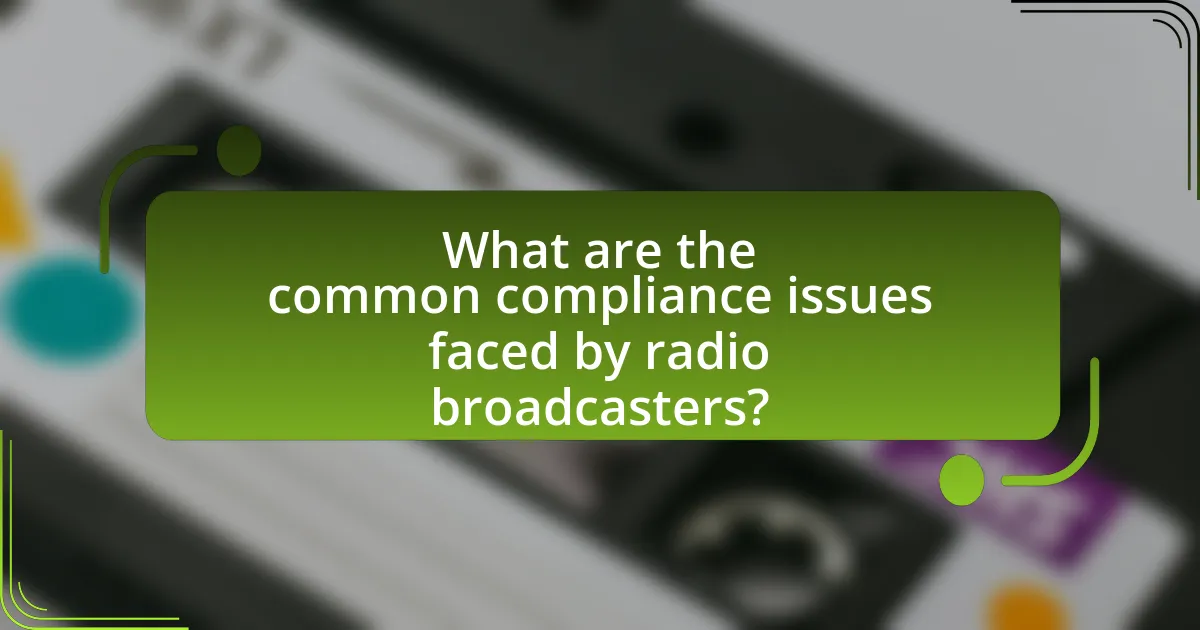
What are the common compliance issues faced by radio broadcasters?
Radio broadcasters commonly face compliance issues related to licensing, content regulations, and public file requirements. Licensing issues arise when broadcasters fail to renew their FCC licenses or operate without the necessary permits, which can lead to fines or loss of broadcasting rights. Content regulations include adherence to decency standards, restrictions on indecent or obscene material, and compliance with rules regarding political advertising and sponsorship identification. Public file requirements mandate that broadcasters maintain accessible records of their programming and advertising, and failure to do so can result in penalties. These compliance challenges are critical as they ensure adherence to federal regulations and maintain the integrity of broadcasting operations.
How can broadcasters ensure compliance with FCC regulations?
Broadcasters can ensure compliance with FCC regulations by implementing a comprehensive compliance program that includes regular training, monitoring, and audits. This program should encompass understanding the specific regulations applicable to their operations, such as content restrictions, licensing requirements, and public interest obligations. For instance, broadcasters must adhere to the FCC’s rules on indecency and obscenity, which prohibit airing certain content during specific hours. Additionally, maintaining accurate public files and conducting periodic self-assessments can help identify and rectify potential compliance issues. The FCC has established guidelines and resources to assist broadcasters in understanding these requirements, reinforcing the importance of proactive compliance measures.
What are the most frequent violations reported by the FCC?
The most frequent violations reported by the FCC include failure to maintain proper public inspection files, unauthorized operation of radio stations, and violations of the Communications Act regarding indecent content. These violations are commonly documented in FCC enforcement actions, highlighting the importance of compliance with regulations. For instance, the FCC has issued numerous fines for inadequate public inspection files, which are required to be accessible to the public and contain essential information about station operations.
How can broadcasters stay updated on regulatory changes?
Broadcasters can stay updated on regulatory changes by subscribing to official communications from the Federal Communications Commission (FCC) and industry associations. The FCC regularly publishes updates, notices, and rule changes on its website, which is a primary source for regulatory information. Additionally, organizations such as the National Association of Broadcasters (NAB) provide resources, newsletters, and alerts regarding changes in regulations that affect broadcasters. These methods ensure that broadcasters receive timely and accurate information about regulatory developments impacting their operations.
What resources are available for navigating FCC regulations?
The primary resources available for navigating FCC regulations include the official FCC website, which provides comprehensive guidelines, rules, and forms relevant to broadcasters. Additionally, the FCC’s Public Notices and Reports offer updates on regulatory changes and compliance requirements. Industry associations, such as the National Association of Broadcasters (NAB), also provide valuable resources, including training sessions and legal advice tailored to broadcasters. Furthermore, consulting legal experts specializing in telecommunications law can provide personalized guidance on navigating complex regulations. These resources collectively ensure that broadcasters remain informed and compliant with FCC regulations.
How can industry associations assist broadcasters with compliance?
Industry associations can assist broadcasters with compliance by providing resources, training, and advocacy related to FCC regulations. These associations often develop guidelines and best practices that help broadcasters understand and implement necessary compliance measures. For example, the National Association of Broadcasters (NAB) offers educational programs and materials that clarify regulatory requirements, ensuring that broadcasters remain informed about changes in legislation. Additionally, industry associations engage in lobbying efforts to represent broadcasters’ interests, which can lead to more favorable regulatory conditions. This support is crucial for maintaining compliance and avoiding potential penalties.
What online tools and resources can help in understanding FCC rules?
Online tools and resources that assist in understanding FCC rules include the FCC’s official website, which provides comprehensive access to regulations, forms, and guidance documents. The website features a searchable database of rules and policies, as well as educational resources like the “FCC Rules and Regulations” section, which outlines specific regulations relevant to broadcasters. Additionally, organizations such as the National Association of Broadcasters (NAB) offer webinars, publications, and advocacy resources that clarify FCC rules and their implications for radio broadcasters. These resources are essential for ensuring compliance and staying informed about regulatory changes.
What best practices should radio broadcasters follow for compliance?
Radio broadcasters should adhere to best practices such as understanding and following FCC regulations, maintaining accurate public files, and ensuring proper licensing for all content. Compliance with FCC regulations is crucial as it helps avoid fines and ensures the station operates legally. Maintaining accurate public files, which include ownership information and programming logs, is mandated by the FCC and promotes transparency. Additionally, securing proper licensing for music and other content protects broadcasters from copyright infringement claims, as evidenced by the requirement for performance rights organizations like ASCAP and BMI. These practices collectively ensure that radio broadcasters operate within legal frameworks and uphold industry standards.
How can broadcasters create an effective compliance plan?
Broadcasters can create an effective compliance plan by conducting a thorough assessment of applicable FCC regulations and establishing clear policies and procedures to adhere to them. This involves identifying specific regulatory requirements, such as content restrictions, licensing obligations, and public interest standards, and integrating these into daily operations. Regular training for staff on compliance issues and ongoing monitoring of programming and practices are essential to ensure adherence. Additionally, maintaining accurate records and documentation can provide evidence of compliance during audits or investigations. According to the FCC’s guidelines, a proactive approach to compliance not only mitigates legal risks but also enhances the broadcaster’s reputation and trust with the audience.
What are the key steps to take when facing a compliance issue?
When facing a compliance issue, the key steps to take include identifying the specific regulation that has been violated, assessing the impact of the violation, and developing a corrective action plan. Identifying the regulation involves reviewing relevant FCC guidelines and understanding the nature of the compliance issue. Assessing the impact requires evaluating potential penalties or repercussions, which can include fines or loss of broadcasting privileges. Developing a corrective action plan entails outlining specific measures to rectify the violation, ensuring future compliance, and documenting all actions taken. These steps are essential for effectively addressing compliance issues and minimizing potential consequences.
